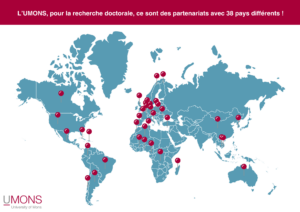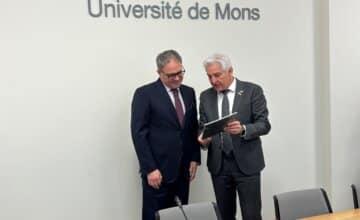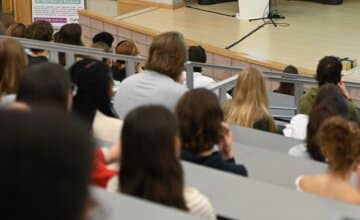UMONS, an internationally oriented research
UMONS, for doctoral research, has partnerships with 38 different countries and more than 120 foreign universities. Doctoral students of 46 nationalities in all fields are involved in 150 cotutelle doctoral theses.
Since September 2022, UMONS has held the presidency of the European alliance EUNICE, which will include 10 public universities in October 2023. Within this framework, the university encourages international partnerships through its European projects, the realization of joint theses or university cooperation in development.
 The co-diplomation of doctoral students is the symbol of a solid collaboration between different institutions. The opening of a university to the world is fundamental for the harmonious and dynamic development of research and teaching activities. One of the main missions of UMONS is to offer an international showcase to its academic community.
The co-diplomation of doctoral students is the symbol of a solid collaboration between different institutions. The opening of a university to the world is fundamental for the harmonious and dynamic development of research and teaching activities. One of the main missions of UMONS is to offer an international showcase to its academic community.
“Our institution has established numerous agreements with partners around the world thanks to the excellence of our research and the many individual contacts of members of the community, proof of the dynamism of our university and our international influence,” says Philippe Dubois, Rector of UMONS.
For the 2022-2023 academic year, outside of Belgium, cotutelles are taking place in Germany, the United Kingdom, Morocco, Poland, Spain, France, Tunisia, Canada, Burkina Faso, and China. Among the 38 countries involved in co-supervision, France has the highest number of partnerships (36%), ahead of Belgium (26%) and Africa (12%).
Some examples of the latest PhD thesis cotutelles started at UMONS within our faculties with a foreign university (non-exhaustive list) :
– Warocqué School of Business and Economics: CADY AYYAD University (Morocco) – Organizational agility
– Faculty of Science: University of LAVAL (Canada- Quebec) – The development of new materials to increase the efficiency of solar cells
– Faculty of Architecture and Urban Planning: La Rochelle University (France) – Coastal risks including the question of social and environmental inequalities; The Jagiellonian University (Poland) – Urbanism and collective gardens
– Faculty of Engineering and Faculty of Science: Université Polytechnique Hauts-De-France (France) – Sensors for physical measurements in extreme temperature conditions; new materials for energy applications and the development of composite materials for biomedical applications
– Faculty of Translation and Interpretation – School of International Interpreters: Universitat Oberta de Catalunya (Spain) – Integration and language policy
– Faculty of Engineering: Joseph Ki-zerbo University (Burkina Faso) – Treatment and recycling of waste from modern batteries
In terms of themes, for all cotutelles since 2009, the top three are composed of the Materials Institute (22%), the Biosciences Institute (14%), and the Energy Institute (13%).




